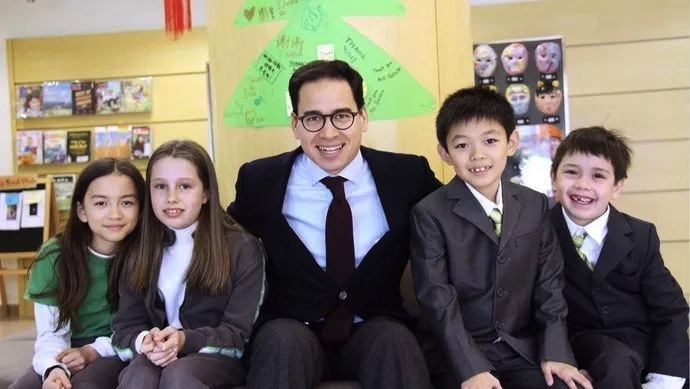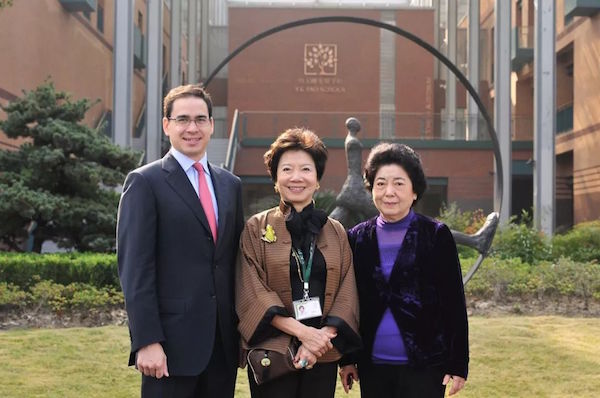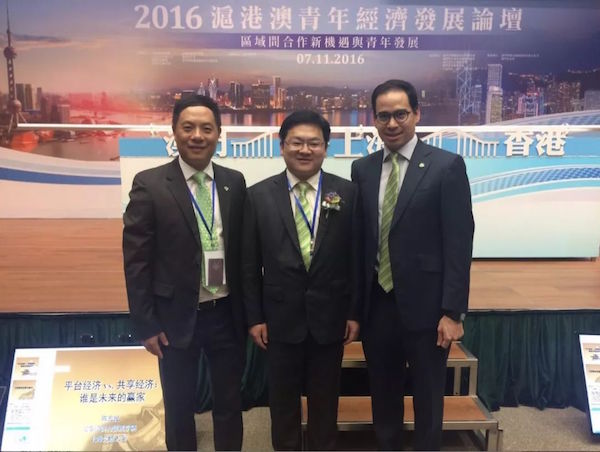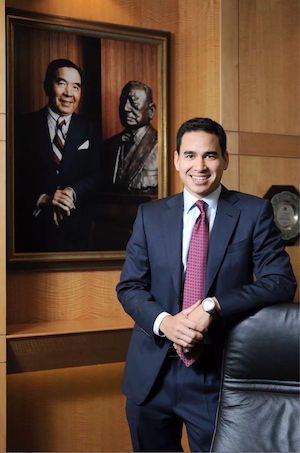Shanghai Observer (a division of Liberation Daily) has recently published an interview with Philip Sohmen, Co-founder and Executive Deputy Chairman of YK Pao School. It is first of the series "Hong Kong People in Shanghai". Please enjoy the article.

Editor's note
Shanghai and Hong Kong are closely linked economically and culturally, with cooperation and exchanges between the two cities enjoying a long history. The foundation for cooperation between Shanghai and Hong Kong is solid, with ample room to develop further in the future. Over the past 40 years, many Hong Kong compatriots have come to Shanghai. At first, they came to work and invest, but over time, they established roots in Shanghai. Since China began "reform and opening up," Hong Kong people have not only witnessed the development of China's cosmopolitan commercial hub but also played a role in the rapid development of both Shanghai and China as a whole. From today, Liberation Daily/Shanghai Observer launches the "Hong Kong People in Shanghai" series, in which we explore the experience of Hong Kong people in Shanghai since the start of "reform and opening up," looking at their impact on Shanghai's development and how their everyday experiences reflect broader themes.
How the grandson of Hong Kong's "King of the Seas" introduced Chinese to Eton College and founded a renowned private school in Shanghai| "Hong Kong people in Shanghai" series
"Hello, Welcome to Hong Kong," says Philip Sohmen in standard Mandarin, reaching out his hand with a smile. In his early 40s, Philip Sohmen is the grandson of the renowned Hong Kong shipping magnate YK Pao and co-founder of YK Pao School. Among his endeavours, it is this role that is most important to him.
“Enriching educational opportunities in China is a family tradition that began with my grandfather and continued with my mother," he says. "I am carrying on this tradition, and making my own contribution to promoting exchanges between Shanghai and Hong Kong."
Shanghai perfectly aligns with our educational philosophy
Today, most parents in Shanghai know that YK Pao School is difficult to get in. For his part, Philip Sohmen, who calls himself “the school’s general handyman," prefers to tell the story of how YK Pao School was founded more than a decade ago.
Philip Sohmen explains that he and his mother decided in 2005 to found a school in mainland China that would be rooted in China with a global perspective. They visited many locations nationwide as they considered where to locate the school. Finally, they chose Shanghai, a city with a reputation for tolerance and openness. Shanghai's ethos best matched that of Pao School itself, Philip Sohmen says. In 2007, the first cohort of students matriculated at Pao School to coincide with the 10-year anniversary of Hong Kong's return to the motherland.
Philip Sohmen recalls the intense period leading up Pao School's establishment. He and his team were crowded into a converted apartment near the school. His office was a bedroom. Team members worked in the living room. The kitchen was converted into the accounting office. The apartment lacked air conditioning and heating, so it was hot in summer and cold in winter. There were even cockroaches scurrying around the place. Yet, Philip Sohmen declined the opportunity to move into a comfortable hotel. He insisted on staying in the apartment with his staff members.

The three founders of Pao School: Philip Sohmen, his mother Anna Pao Sohmen and Madam Tan Fuyun
The bigger challenge was enrollment. When YK Pao School first began to enrol students in 2006, it did not yet have a campus or teachers. The info session was set up in Jiao Tong University's Pao Siu-Loong Library, donated by YK Pao in 1981.
"The only way to persuade parents to send their children to YK Pao School was to assure them our education philosophy, and our missions of whole-person education, passing on traditions of Chinese culture and fostering an international perspective," Philip Sohmen says.
He adds: "In the digital age, we cannot rely on the study of Confucian texts like The Four Books and Five Classics alone, yet learning traditional culture is integral to helping us develop the right values and outlook on life. At the time, these three missions were relatively advanced."
Philip Sohmen recalls fondly when parents at the first info session decided on the spot to enrol their children at YK Pao School. What makes him even more pleased is how fully the children developed at the school. He notes that YK Pao School is a non-profit school. "I have not earned any money from the school," he says. "My goal here is to develop outstanding young talents for Shanghai."
Further, he points out that YK Pao High School awards RMB 6 million in scholarships every year. One full-scholarship student is the son of a worker in Shanghai's subway system.
We are focused on students rather than their families, but the concept of family education must be consistent with the school.
Boosting young Hong Kong people's understanding of the mainland
Over the past decade, Philip Sohmen has been based mostly in Shanghai in order to focus on running YK Pao School. This year, he was re-elected as vice chairman of the Shanghai Youth Federation. One of his priorities is developing ways to facilitate exchanges between Shanghai and Hong Kong.
He notes that the unpleasant things happening in Hong Kong at present derive in part from the Hong Kong youth's lack of familiarity and identification with their motherland. In recent years, he has actively participated in the Hong Kong University Student Internship Program organized by Shanghai-Hong Kong groups. Over the past nine years, more than 500 students from Hong Kong University have come to Shanghai to study. In order to celebrate the 70th anniversary of the founding of the People's Republic of China this year, special arrangements were made for 500 Hong Kong high school students to take the high-speed rail to Shanghai.
Says Philip Sohmen: "It is better for young people to see the tremendous changes in the motherland themselves; this can help them increase their identification with their motherland."

Philip Sohmen hopes that Hong Kong's young people can increasingly come to Shanghai to live and work. In his view, Shanghai's openness and commitment to development offer a wide range of opportunities for them. However, he admits that the number of Hong Kong people who come to the mainland to work is still relatively limited.
"They are worried that the competition is too fierce, and some may feel that they are not aggressive enough to be successful in Shanghai," he says. However, young people in Hong Kong have their own unique strengths such as a strong sense of professionalism and a broad international perspective. With that in mind, he notes that the Hong Kong Youth League Committee is focused on supporting young Hongkongers in Shanghai, particularly helping them to better integrate.
Once Shanghai and Hong Kong people have more deep-rooted exchanges, Philip Sohmen believes that misunderstandings between them will gradually fade away. He gives an example: Several Hong Kong friends told him that they hoped to send their children to Shanghai after they turned 10.
"They originally wanted their children to attend a boarding school in Europe or America. Now they have changed their minds. They want their children to study in Shanghai to learn Mandarin and understand more about China. Our children are our future. When Hong Kong people are willing to send their children to Shanghai, the distance between the two cities will be greatly reduced."
Making history in a traditional British school
Shanghai Observer asked Philip Sohmen: How can a Hong Kong person who studied in the United Kingdom and the United States from the age of 8 speak Mandarin so fluently?
Philip Sohmen attributes his fluency in Mandarin to his mother's insistence that he learn the language. Indeed, he grew up in Hong Kong at a time when Mandarin was not widely taught in schools or spoken by the population. At the age of eight, he went to the United Kingdom to study. As he embarked on his program of overseas studies, his mother made two requests of him: One was to study diligently; the other was to learn Mandarin. To ensure that he learned Chinese, she arranged for the wife of a professor of Chinese at the University of Oxford to serve as his teacher.
Philip Sohmen says: "My mother insisted that I learn Mandarin because of her love for China and her hometown, and also because she and my grandfather saw the changes happening in the mainland and were optimistic about its future. I have benefited a lot from that."
Philip Sohmen is thankful for the foresight of his family. He first came to Shanghai in 1992 to attend the opening ceremony of the Pao Siu-Loong Library at the Minhang campus of Jiaotong University. When visiting the Bund, he noticed that Pudong, on the opposite side of the river, was nothing but farmland. In 2007, when he came to work in Shanghai on the construction of Pao School, Pudong had transformed into a modern city. In less than 15 years, Shanghai had undergone momentous changes.

"I love Hong Kong and I love Shanghai," Philip Sohmen told reporters. He said that he hopes to pass on his grandfather's spirit - having a Chinese heart while being a citizen of the world - and through his own efforts help Hong Kong's youth better understand the motherland and help more compatriots from Shanghai and all of China make their way onto the world stage."